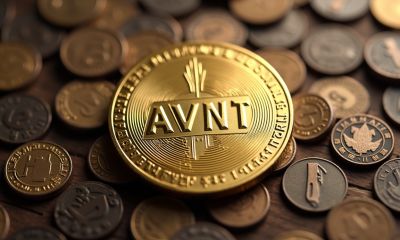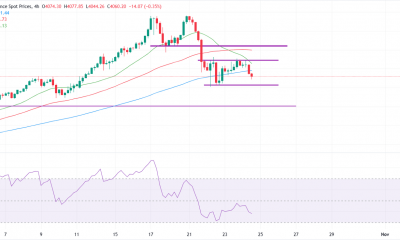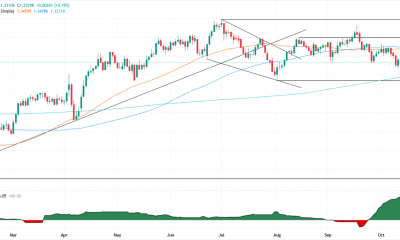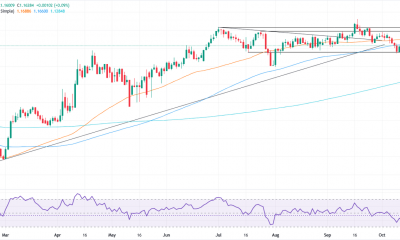

Technology
Europe has led the global charge against big tech. But does it need a new approach? – Crypto News
In the past couple of decades, Europe and America have taken different paths in how they regulate large firms. American watchdogs largely sat back as big business got bigger, most notably the tech mastodons like Google, Apple and Facebook. Europe, in contrast, felt mega-corporations needed to be kept in check. Its regulators became the world’s most fearful, none more so than Margrethe Vestager, the EU’s antitrust chief since 2014. Even as Europe failed to come up with tech giants of its own, it was not in California or Washington that Silicon Valley faced most scrutiny, but in rainy Brussels, home to the European Commission.
Liberals anxious to keep markets open and vibrant—including this newspaper—cheered Ms Vestager and the tough approach she embodied. Energetic enforcement of competition rules meant lower prices for European consumers shopping for flights, phone calls and more. Americans meanwhile got bilked by firms that had been allowed to consolidate until little competition remained. Perhaps surprisingly, Europe took on even the mighty tech giants, imposing multi-billion-euro fines on the likes of Google and, at times, forcing changes to tech business models. A sweeping new set of rules, known as the Digital Markets Act (DMA), comes into force this year, giving the EU more powers over large tech firms. When the Biden administration from 2021 looked to reverse decades of lax antitrust enforcement in America, its watchdogs borrowed many of their ideas from Ms Vestager.
Europe might be flattered by such imitation. Nevertheless it should now ask itself if its strong-arm approach is still the right one. For even as its regulatory reasoning has remained the same, the corporate environment it is applying it to has changed. At least when it comes to big tech—antitrust’s thorniest problem—things have not panned out as Europe thought they would. That should prompt fresh thinking on how to regulate online champions.
Ms Vestager’s regulatory method is premised on the idea that consumer tech markets tend to winner-takes-all outcomes: firms that gain an early advantage go on to secure an unassailable perch. Once you’ve told Facebook who all your friends are, moving to a rival network is all but impossible, even if the site offers a terrible experience. Google fine-tuned its services using troves of data, including years of its users’ search and browsing histories. That entrenches its market power. Only by forcing tech incumbents to open up—for example by forcing Google to hand over data to potential rivals to help them train their offerings—could the playing field be somewhat levelled.
That was the theory. But recent developments suggest that the tech is far more up-for-grabs than Ms Vestager supposed. Facebook is now struggling to keep current users engaged, let alone to attract young ones. Teens have decamped to TikTok, a zippy short-video app from China. For the first time in two decades of dominance, Google is facing a challenge to the search engine that underpins its profits. Advances in artificial intelligence (AI) are powering a new generation of rivals. Microsoft’s Bing, long a distant also-ran, is the latest sensation. Supposed future monopolists like Uber and Netflix have been flagged. Across Silicon Valley, tech firms are now laying off workers. The share prices of the biggest firms have sagged, because investors who used to imagine boundless monopoly profits tomorrow now assume competition will grind down margins.
Is big tech’s weakening grip on consumers a sign that Europe’s approach is working? On the contrary. It was not regulatory action that spurred rivals: both Bing and TikTok have relied on ingenuity more than a helping hand from the state. The lure of capturing vast profit pools spurred innovation, to the benefit of consumers. This is what America’s hands-off school of antitrust said would happen—and Europe’s assumed could not.
Charlemagne put this case to Ms Vestager in her Brussels office recently. Admirably for a regulator, she is open to those wondering if the assumptions behind the approach that has made her a star among trustbusters may be obsolete. The Dane has noticed tech’s recent travails. But she still sees life in her old strict approach. “It may be over time that digital monopolies are toppled,” she says, “but time is not something you have if you want the full potential of innovation to be unlocked.” There is plenty of market power to be abused in the years it takes for a better search engine or social-media platform to come along. The power of AI to disrupt monopolies may prove illusory, she says. Mass sackings and sagging share prices are a sign of deflated hype following a pandemic-driven boom, not thriving competition.
facebook plant
Ms Vestager’s record in keeping competition vibrant in old-world industries is creditable. A lot of what she has done to him in big tech—for example all but banning acquisitions of potential future rivals by large incumbents—still looks sensible. But now she is being guided to do ever more to rein in the titans. In America a new generation of gung-ho trustbusters is now in charge, with no time for the hands-off model once preferred there. They are stretching competition rules to the limit in a bid to bring large companies to heel, often for ideological reasons. Thanks to the DMA, Europe will gain vast new powers to police large “gatekeeper” firms like Amazon and Apple, so preventing anti-competitive behavior before it happens. Silicon Valley’s foes are hoping Europe will once again become the tech clobberer-in-chief. .
This challenge need not be taken up by Ms Vestager. Perhaps fresh evidence will emerge that the antitrust screws do indeed need to be tightened. But a regulator of her caliber should be alive to the possibility that the opposite may be needed. Europe made decisions based on facts at hand; if those facts change, there is no shame in adjusting one’s approach. Watchdogs should aim to be as nimble as the businesses they regulate. That can mean being brave enough to bin ideas and adapt to a new reality.
Read more from Charlemagne, our columnist on European politics:
Germany is letting a domestic squabble pollute Europe’s green ambitions (Mar 9th)
After seven years of Brexit talks, Europe has emerged as the clear winner (Mar 2nd)
Why Vladimir Putin will never stand trial in The Hague (Feb 23rd)
Also: How the Charlemagne column got its name
© 2023, The Economist Newspaper Limited. All rights reserved. From The Economist, published under license. The original content can be found on www.economist.com
Catch all the technology news and Updates on Live Mint. Download Mint News App to get Daily market update Live business news,
-

 Blockchain1 week ago
Blockchain1 week agoAfrica Countries Pass Crypto Laws to Attract Industry – Crypto News
-
Cryptocurrency1 week ago
XRP News: Ripple Unveils ‘Ripple Prime’ After Closing $1.25B Hidden Road Deal – Crypto News
-

 Cryptocurrency1 week ago
Cryptocurrency1 week agoDOGE to $0.33 in Sight? Dogecoin Must Defend This Key Level First – Crypto News
-
others1 week ago
JPY soft and underperforming G10 in quiet trade – Scotiabank – Crypto News
-

 Blockchain1 week ago
Blockchain1 week agoXRP Price Gains Traction — Buyers Pile In Ahead Of Key Technical Breakout – Crypto News
-

 Blockchain1 week ago
Blockchain1 week agoISM Data Hints Bitcoin Cycle Could Last Longer Than Usual – Crypto News
-

 Cryptocurrency1 week ago
Cryptocurrency1 week agoWhat next for Avantis price after the 73% recovery? – Crypto News
-

 Technology1 week ago
Technology1 week agoNothing OS 4.0 Beta introduces pre-installed apps to Phone (3a) series: Co-founder Akis Evangelidis explains the update – Crypto News
-

 Technology5 days ago
Technology5 days agoSam Altman says OpenAI is developing a ‘legitimate AI researcher’ by 2028 that can discover new science on its own – Crypto News
-

 Cryptocurrency1 week ago
Cryptocurrency1 week agoTrump plans to pick Michael Selig to lead CFTC: Report – Crypto News
-

 Blockchain1 week ago
Blockchain1 week agoEthereum Rebounds From Bull Market Support: Can It Conquer The ‘Golden Pocket’ Next? – Crypto News
-

 De-fi1 week ago
De-fi1 week agoNearly Half of US Retail Crypto Holders Haven’t Earned Yield: MoreMarkets – Crypto News
-

 Cryptocurrency1 week ago
Cryptocurrency1 week agoBitcoin’s institutional surge widens trillion-dollar gap with altcoins – Crypto News
-

 Technology1 week ago
Technology1 week agoUniswap Foundation (UNI) awards Brevis $9M grant to accelerate V4 adoption – Crypto News
-

 Blockchain1 week ago
Blockchain1 week agoBinance Stablecoin Outflow On A Steady Rise — What This Means For The Market – Crypto News
-
others1 week ago
Indian Court Declares XRP as Property in WazirX Hack Case – Crypto News
-

 Cryptocurrency1 week ago
Cryptocurrency1 week agoWestern Union eyes stablecoin rails in pursuit of a ‘super app’ vision – Crypto News
-

 Technology1 week ago
Technology1 week agoFrom Studio smoke to golden hour: How to create stunning AI portraits with Google Gemini – 16 viral prompts – Crypto News
-
Business1 week ago
PEPE Coin Price Prediction as Weekly Outflows Hit $17M – Is Rebound Ahead? – Crypto News
-

 Cryptocurrency1 week ago
Cryptocurrency1 week agoHYPE Breaks Out After Robinhood Listing and S-1 Filing: What’s Next? – Crypto News
-

 De-fi1 week ago
De-fi1 week agoHYPE Jumps 10% as Robinhood Announces Spot Listing – Crypto News
-
others1 week ago
Platinum price recovers from setback – Commerzbank – Crypto News
-

 others1 week ago
others1 week agoGold trims losses after softer US inflation reinforces dovish Fed outlook – Crypto News
-
Business1 week ago
White House Crypto Czar Backs Michael Selig as ‘Excellent Choice’ To Lead CFTC – Crypto News
-
others1 week ago
Bitcoin Price Eyes $120K Ahead of FED’s 98.3% Likelihood to Cut Rates – Crypto News
-

 Technology1 week ago
Technology1 week agoMint Explainer | India’s draft AI rules and how they could affect creators, social media platforms – Crypto News
-
others1 week ago
GBP/USD holds steady after UK data, US inflation fuels rate cut bets – Crypto News
-

 Blockchain1 week ago
Blockchain1 week agoXRP/BTC Retests 6-Year Breakout Trendline, Analyst Calls For Decoupling – Crypto News
-

 Cryptocurrency1 week ago
Cryptocurrency1 week agoUSDJPY Forecast: The Dollar’s Winning Streak Why New Highs Could Be At Hand – Crypto News
-
others1 week ago
Is Changpeng “CZ” Zhao Returning To Binance? Probably Not – Crypto News
-

 Cryptocurrency1 week ago
Cryptocurrency1 week agoFetch.ai and Ocean Protocol move toward resolving $120M FET dispute – Crypto News
-
Technology1 week ago
Can Hype Price Hit $50 After Robinhood Listing? – Crypto News
-

 Technology1 week ago
Technology1 week agoOpenAI announces major Sora update: Editing, trending cameos, and Android launch on the way – Crypto News
-

 Metaverse1 week ago
Metaverse1 week agoGemini in Gmail automates meeting schedules effortlessly – Crypto News
-

 Blockchain1 week ago
Blockchain1 week agoEntire Startup Lifecycle to Move Onchain – Crypto News
-

 Cryptocurrency1 week ago
Cryptocurrency1 week agoNEAR’s inflation reduction vote fails pass threshold, but it may still be implemented – Crypto News
-

 Technology1 week ago
Technology1 week agoSurvival instinct? New study says some leading AI models won’t let themselves be shut down – Crypto News
-

 others7 days ago
others7 days agoGBP/USD floats around 1.3320 as softer US CPI reinforces Fed cut bets – Crypto News
-

 Cryptocurrency5 days ago
Cryptocurrency5 days agoCitigroup and Coinbase partner to expand digital-asset payment capabilities – Crypto News
-

 Cryptocurrency5 days ago
Cryptocurrency5 days agoInside Bitwise’s milestone solana ETF launch – Crypto News
-
others1 week ago
Silver consolidates below $49 amid Fed rate-cut bets – Crypto News
-
Business1 week ago
HBAR Price Targets 50% Jump as Hedera Unleashes Massive Staking Move – Crypto News
-

 others1 week ago
others1 week agoEUR/USD hovers at 1.1600 as muted CPI data fails to alter Fed stance – Crypto News
-
Business1 week ago
Trump Picks SEC Crypto Counsel Michael Selig to Lead CFTC Amid Crypto Oversight Push – Crypto News
-

 Blockchain1 week ago
Blockchain1 week agoPump.Fun Rallies 10% After Acquisition Of Trading Terminal Padre – Crypto News
-
Technology1 week ago
Analyst Eyes Key Support Retest Before a Rebound for Ethereum Price Amid $93M ETF Outflows and BlackRock Dump – Crypto News
-
Business1 week ago
Ripple Explores New XRP Use Cases as Brad Garlinghouse Reaffirms Token’s ‘Central’ Role – Crypto News
-
others1 week ago
Tether’s Stablecoin 1.0 Era Is Over – Now the Industry Needs 2.0 – Crypto News
-

 De-fi1 week ago
De-fi1 week agoAave Labs Acquires Stable Finance to Expand DeFi Access – Crypto News
-

 Blockchain1 week ago
Blockchain1 week agoKyrgyzstan Launches Stablecoin While Confirming Future CBDC – Crypto News












